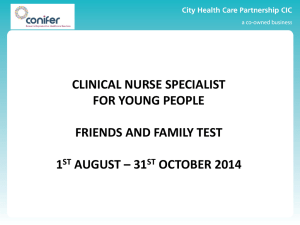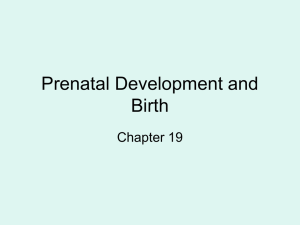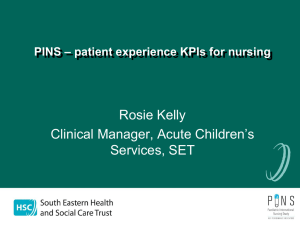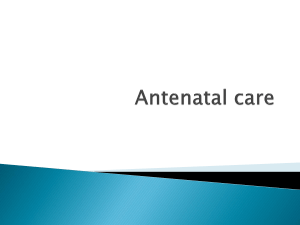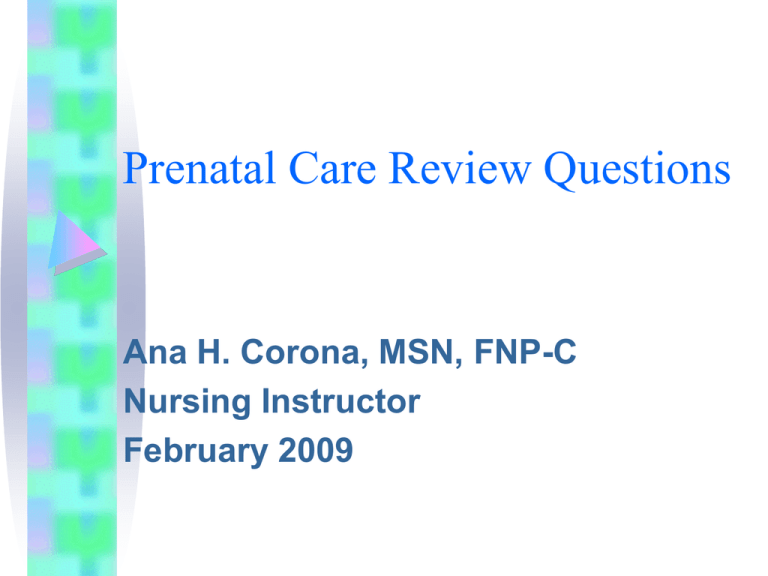
Prenatal Care Review Questions
Ana H. Corona, MSN, FNP-C
Nursing Instructor
February 2009
• A client arrives at a prenatal clinic for
the first prenatal assessment. The
client tells a nurse that the first day
of her last menstrual period was
September 19, 2005. Using Nagele’s
rule, the nurse determines the
estimated date of confinement as:
a. July 26, 2006
b. June 12, 2007
c. June 26, 2006
d. July 12, 2007
• answer is c
• A nurse is performing an assessment of a
pregnant client who is at 28 weeks of
gestation. The nurse measures the fundal
height in centimeters and expects the
findings to be which of the following:
a. 22 cm
b. 30 cm
c. 36 cm
d. 40 cm
• answer is b
A pregnant client is seen in a health care clinic
for a regular prenatal visit. The client tells
the nurse that she is experiencing irregular
contractions and the nurse determines that
she is experiencing Braxton Hicks
contractions. Based on this finding, which
nursing actions is most appropriate:
a. instruct the client to maintain bed rest for
the remainder of the pregnancy.
b. inform the client that these are common and
may occur throughout the pregnancy
c. contact the physician
d. call the maternity unit and inform them that
the client will be admitted in a pre-labor
condition.
• answer is b
• A nurse is reviewing the record of a client
who has just been told that a pregnancy
test is positive. The physician has
documented the presence of Goodell’s
sign. The nurse determines that this sign
indicates:
a. softening of the cervix
b. a soft blowing sound that corresponds to
the maternal pulse during auscultation of
the uterus.
c. the presence of human chorionic
gonadotropin in the urine.
d. the presence of fetal movement.
• Answer is a
• A nursing instructor asks a nursing student who
is preparing to assist with the assessment of a
pregnant client to describe the process of
quickening. Which of the following statements if
made by the student indicates an understanding
of this term?
a. It is the irregular, painless contractions that occur
throughout pregnancy
b. It is the soft blowing sound that can be heard
when the uterus is auscultated
c. it is the fetal movement that is felt by the mother
d. it is the thinning of the lower uterine segment.
• Answer is C
• A nurse midwife is performing an assessment
of a pregnant client and is assessing the
client for the presence of ballottement. Which
of the following would the nurse implement to
test for the presence of ballottement?
a. auscultating for fetal heart sounds
b. Palpating the abdomen for fetal movement
c. assessing the cervix for thinning
d. initiating a gentle upward tap on the cervix
• Answer is D
• A pregnant client asks the nurse in
the clinic when she will be able to
start feeling the fetus move. The
nurse responds by telling the mother
that the fetal movement will be noted
between:
a. 6 and 8 weeks
b. 8 and 10 weeks
c. 10 and 12 weeks
d. 14 and 16 weeks
• The answer is D
• Softening of the cervix is:
a. Hegar’s Sign
b. Quickening
c. Goodell’s Sign
d. Chadwick’s Sign
• The answer is C
• A 36 week pregnant woman with a 3
year old, a 1 year old and has a
miscarriage at 7 weeks would be:
•
•
•
•
a. G4P2A1
b. G4P2A0
c. G3P2A1
d. G4P4A0
• Answer is A
A nursing instructor is conducting lecture and
is reviewing the functions of the female
reproductive system. She asks Mark to
describe the follicle-stimulating hormone
(FSH) and the luteinizing hormone (LH).
Mark accurately responds by stating that:
1. FSH and LH are released from the anterior
pituitary gland.
2. FSH and LH are secreted by the corpus luteum of
the ovary
3. FSH and LH are secreted by the adrenal glands
4. FSH and LH stimulate the formation of milk
during pregnancy
Answer is 1
1. FSH and LH, when stimulated by
gonadotropin-releasing hormone
from the hypothalamus, are
released from the anterior pituitary
gland to stimulate follicular growth
and development, growth of the
graafian follicle, and production of
progesterone.
•
A nurse is describing the process of
fetal circulation to a client during a
prenatal visit. The nurse accurately
tells the client that fetal circulation
consists of:
1. Two umbilical veins and one umbilical
artery
2. Two umbilical arteries and one umbilical
vein
3. Arteries carrying oxygenated blood to
the fetus
4. Veins carrying deoxygenated blood to
the fetus
Answer is 2
• 2. Blood pumped by the embryo’s heart
leaves the embryo through two umbilical
arteries.
• Once oxygenated, the blood then is
returned by one umbilical vein.
• Arteries carry deoxygenated blood and
waste products from the fetus, and veins
carry oxygenated blood and provide
oxygen and nutrients to the fetus.
•
A nurse is assisting in performing an
assessment on a client who suspects
that she is pregnant and is checking the
client for probable signs of pregnancy.
Select all probable signs of pregnancy.
1. Uterine enlargement
2. Fetal heart rate detected by nonelectric
device
3. Outline of the fetus via radiography or
ultrasound
4. Chadwick’s sign
5. Braxton Hicks contractions
6. Ballottement
Answer is 1,4,5 and 6
The probable signs:
Uterine enlargement, Hegar’s sign,
Goodell’s sign, Chadwick’s sign,
ballottement, Braxton Hicks
contractions and a positive pregnancy
test measuring for hCG.
Positive signs of pregnancy include fetal
heart rate detected by Doppler at 10-12
weeks, active fetal movements
palpable by the examiner, and an
outline of the fetus via radiography or
ultrasound.
•
A client in the 1st trimester of pregnancy arrives at
a clinic and reports that she has been experiencing
vaginal bleeding. A threatened abortion is
suspected, and the nurse instructs the client
regarding management of care. Which statement, if
made by the client, indicates a need for further
education?
1. “I will maintain strict bedrest throughout the
remainder of pregnancy.”
2. “I will avoid sexual intercourse until the bleeding
has stopped, and for 2 weeks following the last
evidence of bleeding.”
3. “I will count the number of perineal pads used on
a daily basis and note the amount and color of
blood on the pad.”
4. “I will watch for the evidence of the passage of
tissue.”
Answer is 1
•
•
•
•
Strict bed rest throughout the remainder of
pregnancy is not required.
The woman is advised to curtail sexual
activities until the bleeding has ceased,
and for 2 weeks following the last evidence
of bleeding or as recommended by the
physician.
The woman is instructed to count the
number of perineal pads used daily and to
note the quantity and color of blood on the
pad.
The woman also should watch for the
evidence of the passage of tissue.
•
In a lecture on sexual functioning,
the nurse plans to include the fact
that ovulation occurs when the:
1. Oxytocin is too high
2. Blood level of LH is too high
3. Progesterone level is high
4. Endometrial wall is sloughed off.
Answer is 2
It is the surge of LH secretion in
midcycle that is responsible for
ovulation.
•
The chief function of progesterone is
the:
1. Development of the female reproductive
system
2. Stimulation of the follicles for ovulation
to occur
3. Preparation of the uterus to receive a
fertilized egg
4. Establishment of secondary male sex
characteristics
Answer is 3
Progesterone stimulates differentiation
of the endometrium into a secretory
type of tissue.




